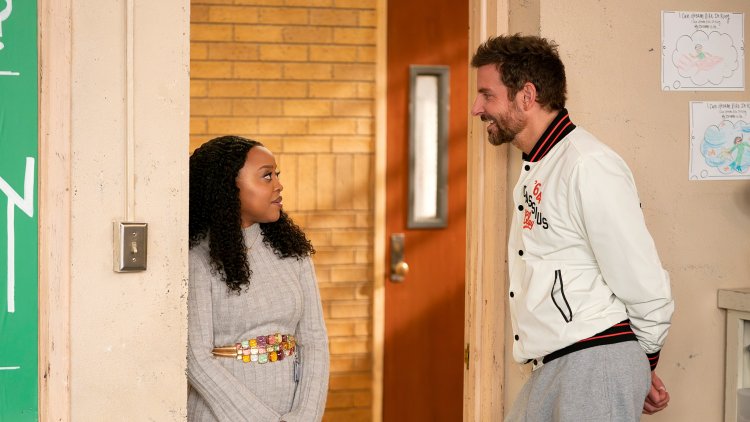Why That Big <em>Abbott Elementary</em> Cameo Made So Much Sense
As the show has gotten more popular, it hasn’t abandoned its distinct regional humor.

Last night, Bradley Cooper basked in the warmth of an adoring audience. It didn’t happen at the 96th Academy Awards, where his film Maestro had been nominated in several categories—and ultimately went home winless. Instead, at the beginning of the latest Abbott Elementary episode, which aired immediately after the Oscars, Cooper sauntered into a Philadelphia classroom’s show-and-tell at the behest of a student who excitedly introduced him as “a famous person I saw outside.” The actor then explained why he was there in the first place: “Well, whenever I’m in Philly, you know the deli across the street? That’s my first stop. My dad used to always take me there.”
Cooper’s cameo didn’t feel overpowering or forced; as it turns out, the student who requested that he come to the classroom didn’t even know who the actor was. (“Everybody wanted to take a picture with him, so I figured he was famous,” the child said.) By the time the episode ended, it was easy to forget that Cooper had been there at all. That someone so high-profile could be integrated so naturally into the show’s rhythm helps explain why Abbott Elementary has remained confident, delightfully funny, and wholly original even as its popularity has skyrocketed. The sitcom didn’t rope just any Oscar-nominated actor into its post-ceremony episode—it featured Hollywood’s preeminent cheesesteak enthusiast, proof that the show hasn’t let go of its charming, hyper-specific regionality.
The Emmy-winning show is big enough to air right after the Oscars, but it has resisted the common network-sitcom imperative to prioritize broad demographic appeal. Other popular programs have sometimes felt removed from the real-life city they’re set in, whether that means ignoring the location altogether or presenting a glossy, sanitized portrait of adult life (Friends, How I Met Your Mother). Three seasons in, Abbott’s center of gravity is still Philadelphia—and not only the surface Philly of Silver Linings Playbook or Eagles-fandom lore. Like the long-running series It’s Always Sunny in Philadelphia, Abbott derives much of its humor from quotidian, city-specific references. Cooper, who is not the first famous Philadelphia hero to make a guest appearance this season, announced his exit from show-and-tell by saying he needed to go pick up his hoagie—but not before pointing out that Philly schools are “criminally underfunded.”
Cooper’s line, which echoed the rhetoric that audiences more often hear from Abbott’s teachers, helped set up the plot stakes for the rest of the episode. After he leaves, Abbott Elementary’s most eager teacher, Janine Teagues (played by the show’s creator, Quinta Brunson), has some exciting news: Abbott has been chosen as a historic Philadelphia landmark. The school’s chaotic principal, Ava Coleman (Janelle James), is thrilled by the prospect of receiving more funding from the city because of the special designation. But two longtime teachers, Melissa Schemmenti (Lisa Ann Walter) and Barbara Howard (Sheryl Lee Ralph), are less enthused—to them, the commemoration hoopla sounds like a cynical bureaucratic play. Their skepticism underscores one of the show’s most consistent themes: School-district officials, politicians, and charter-school advocates often fail the public-school students they claim to serve.
This season, the tension between educators and the city employees whose choices affect students’ day-to-day lives gets an interesting twist. When Janine accepts a fellowship with the district, her optimism makes for an uneasy fit in the halls of power—and with the rest of the Abbott teachers. The veteran teachers are proved right about the historic-landmark status, putting them at odds with Janine. That gives the former colleagues plenty of ammunition for the show’s standard workplace bickering, and eventually leads to a much bigger confrontation in the episode: At the “pre-party” to celebrate the new designation, protesters from an organization called B.L.A.C.K.S. (Building Love and Creating Kids’ Safety) disrupt the event. They explain that the school’s founder, Willard R. Abbott, was a racist—a city planner whose “plan was to uphold segregation while redlining all of Philadelphia,” one of the concerned protesters informs the Abbott teachers.
[Read: Not just the janitor of Abbott Elementary]
The inner workings of municipal entities may not sound like riveting comedic fodder, but Abbott wrings constant humor from the true-to-life hurdles that educators face (without turning their students into avatars of dysfunction). The future of public monuments and educational institutions named after racists and Confederate generals has been a subject of national interest for years now, and Abbott enters this broader dialogue with a clear sense of its own geographic identity. The district representatives admit they knew that Abbott was a racist, but Philadelphia, like many other American cities, is rife with monuments to men like him. Here, jokes about the city’s storied landmarks and its bureaucratic bottlenecks help ground some of the sitcom’s headier themes. When a teacher proposes simply changing the school’s name, a district employee is quick to shut the idea down: “We already have 100 school names and mascots already in line for a makeover, and the ones that are racist without having to Google are priority.”
Without spoiling too much, the teachers end up figuring out an alternative solution to the inadvertent PR conundrum by highlighting a different, more deserving element of local history, educating Abbott employees and students alike in the process. The moment doesn’t offer any overly grand pronouncements about racism in American education or superfluous commentary about the state of politics. Instead, the episode ends on a hopeful note that feels true to Abbott’s teachers and to the show’s distinct sensibilities. In addition to Cooper’s splashy cameo, it also manages to tie in the show’s central will-they-won’t-they romance and plenty of absurdist humor, making it just one highlight of a more daring season that’s continuing to cement Abbott’s place in sitcom history.
What's Your Reaction?




















